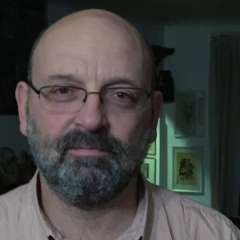For many of Verdi’s admirers, the operatic character of the Messa di Requiem – composed in 1873 as an homage to Alessandro Manzoni, the Italian writer Verdi venerated – is more important than its setting of the propers of the Latin Missa pro defunctis. This is not conductor Teodor Currentzis’ perception. He adamantly declared that “Verdi's Requiem is sacred, even holy music. This has to do with God. When Verdi presents himself as an agnostic, he is misleading us.” Making their debut in New York, Currentzis and his musicAeterna ensemble presented an utterly memorable version of Verdi’s masterpiece that was both a spectacle and a soul-searching exercise for the musicians as well as for the listeners.
The mise-en-scène had two distinct components. Ab initio, the instrumentalists, chorus and soloists emerged from total darkness. Garbed in black cassocks, the members of the orchestra – except the cellists – stood and swayed during the entire performance like a flock of monks at their matins prayers. At the same time, two screens showed moving images, especially created for the occasion by Jonas Mekas, the Lithuanian-born artist who passed away last January. Beginning with images of an urban fire, mostly portraying fragile wildflowers, including personal mementos (the interior of a church, a statue of Dante), but also references to famine and natural and man-made disasters, this was a compendium of statements that might have had a deep meaning for their creator, but were difficult to follow. Except rare moments – the brief apparition of a lamb – there was little connection between the moving images and what was happening on the stage proper. Avoiding getting distracted was a challenge for the public.
Only when confronted with Currentzis’ presence on stage and following his gestures – suggesting more the re-enactment of an ancient ritual than the mere act of nudging musicians toward an established goal – one could comprehend how a seemingly unbounded combination of natural talent, charisma and dynamism propelled the conductor from a Russian cultural backwater at the foot of the Urals to the limelight of, say, the Salzburg Festival.
The first bars – with the barely audible cello descending line, taken over by the other strings and followed by the chorus intoning with transcendent softness “Requiem aeternam dona eis, Domine” – sounded truly amazing in The Shed, the new culture venue on the western side of Manhattan that was not necessarily designed with the best acoustics in mind. During the entire evening, the consequences of the orchestra and chorus’ uncompromising approach to music making with characteristically untimed hours of rehearsal – clearly, a true labor of love – were easily palpable. One could sense these results in the perfect blending between different orchestral compartments and the choral voices, in the tremendous intensity of the trumpets and timpani in the Dies irae, in the accuracy of the contrapuntal lacework, or in the pppp-marked final Libera me. Verdi’s enormous gift for guiding his listeners through a plethora of emotional states from terror to humility to hope was highlighted with great care and with wondrous results by Currentzis and his ensemble.
Soprano Zarina Abaeva started tentatively but became more and more confident, her voice soaring over the chorus and orchestra in the Libera me when she was placed behind the instrumentalists and in front of the chorus. Mezzo Clémentine Margaine was remarkable in her intensity and dark mahogany voice in a part often overshadowed by the other soloists. Tenor René Barbera excelled in the Ingemisco, his clear phrasings rivaling with those of the brass players. Mors stupebit was rendered with great calm and authority by bass Evgeny Stavinsky.
This rendition of Verdi’s Requiem was an impressive accomplishment. What Currentzis and musicAeterna did was equivalent to removing the darkened veneer from an old oil painting, giving it back its freshness and immediacy. Their belated New York debut should be followed by other invitations to perform here.


